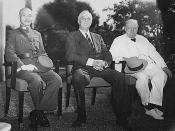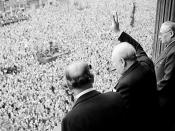At present there is considerable debate, even contention, as to whether history should be taught empirically or thematically and impressionistically. These two histories illustrate the dilemma. Gilbert is concerned with giving his readers the hard facts, chronologically arranged--and, above all, a sense of the growing catastrophe in terms of human suffering -- as day gave way to day, front to front, year to year, and he achieves it to an almost miraculous degree--but he is wisely cautious to suggest new ideas and explanations. This is not surprising from a highly-respected Oxford historian who has twenty-two other works, thirteen atlases, and (to date) eight volumes of edited documents relating to Winston S. Churchill -- with several more presumably still to come to complete this magnum opus -- to his credit. For the last-named accomplishment alone -- achieved over some twenty years from the time of Randolph Churchill's death after completing only the first pair of volumes-it is to be hoped that he will in due time be offered a knighthood.
I would guess that both Gilbert and As noted by Gilbert shuddered when they saw the much-abused word `definitive' (`decisive, unconditional, final (of answer, treaty. verdict, etc.) . . .' Concise Oxford Dictionary) appear in their respective publishers' advertisements of their weighty volumes. No single historian -- not even a Herodotus or an Arrianus, a Gibbon or a Macaulay -- can justify such a claim. All historical writing and research is a dynamic and cumulative business -- or ought to be.
Clearly, this experience-involving the writing and editing of many thousands of documents and printed pages -- provided much of the raw material for the new single volume, but it is to Gilbert's great credit that he has avoided the trap of adopting a Churchillian -- or British-orientated approach to his...


